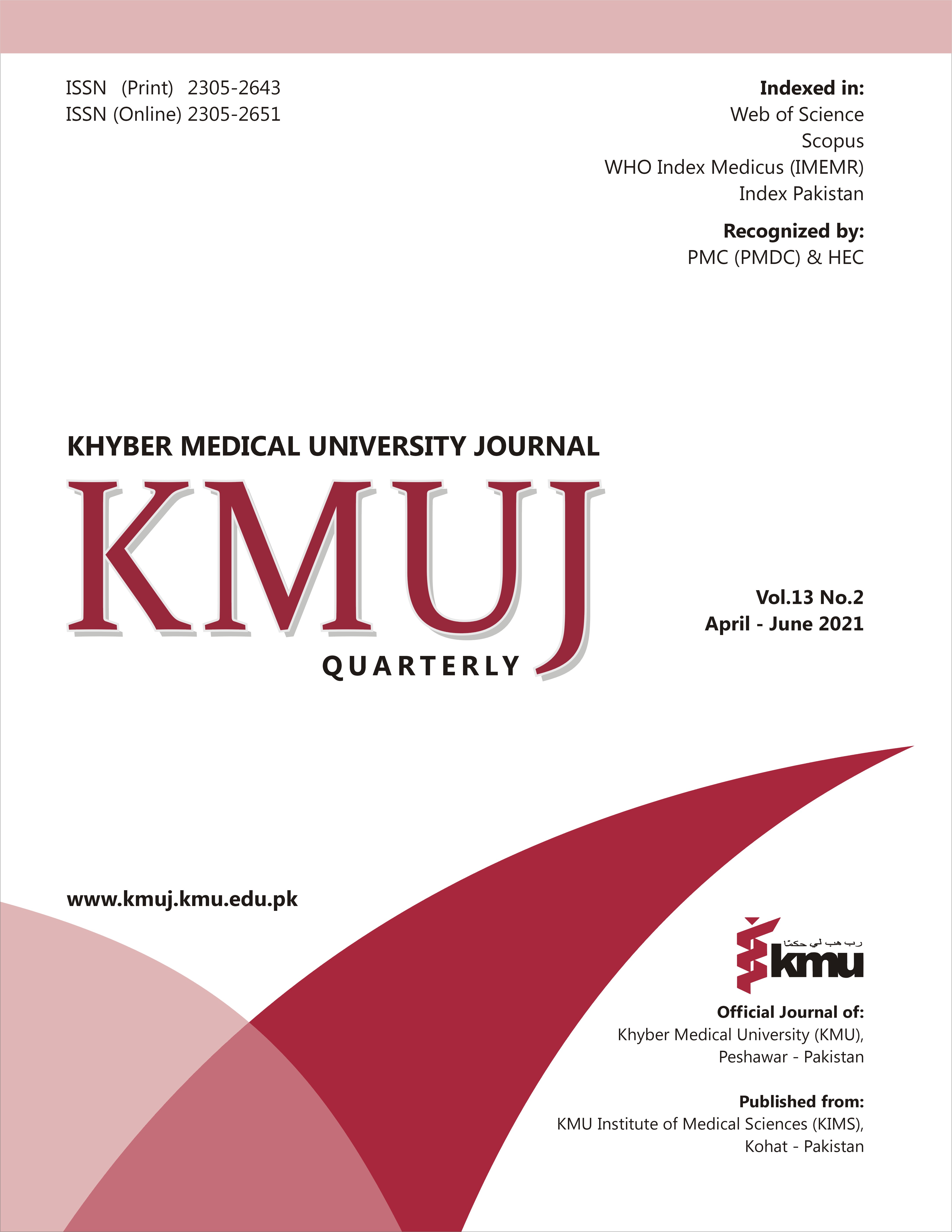TYPE 2 DIABETES MELLITUS: A RISK FACTOR OF AGGRESSION IN ADULTS
Main Article Content
Abstract
OBJECTIVE: To examine the problem of aggression (physical aggression, verbal aggression, anger and hostility) among patients with type 2 diabetes mellitus (T2DM) in comparison to normal adults.
METHOD: The present study was carried out from February to April 2019 in Faisalabad city that employed comparative research method with independent group research design. One hundred (n=100) patients suffering from T2DM, and one hundred (n=100) non-diabetic participants (normal adults) were recruited. Aggression Questionnaire was used to examine the aggression (physical aggression, verbal aggression, anger and hostility) among all participants. Data were analyzed with descriptive statistics, Shapiro-Wilk normality test and independent samples t-test via SPSS, Version 22.0.
RESULTS: Normality test indicated the normal distribution of data (p=0.447) related to aggression questionnaire. Results of independent samples t-test revealed that adults with T2DM reported more aggression (t=3.90, df=198, p=0.000), verbal aggression (t =2.85, df=198, p =0.005), anger (t=2.92, df=198, p =0.004) and hostility (t =4.29, df=198, p =0.000) than normal adults. Both groups did not report physical aggression with significant difference (t=1.34, df=198, p =0.180).
CONCLUSION: T2DM is a potent risk factor of aggression in adults. T2DM patients mostly become verbally aggressive towards others. They also respond to external environment with intense anger and hostility. Thus, management of aggressive thoughts and acts is equally essential besides coping with the disease.
Article Details
Work published in KMUJ is licensed under a
Creative Commons Attribution 4.0 License
Authors are permitted and encouraged to post their work online (e.g., in institutional repositories or on their website) prior to and during the submission process, as it can lead to productive exchanges, as well as earlier and greater citation of published work.
(e.g., in institutional repositories or on their website) prior to and during the submission process, as it can lead to productive exchanges, as well as earlier and greater citation of published work.
References
World Health Organization (WHO). Diabetes. [Accessed on: September 11; 2019]. Available from URL: https://www.who.int/news-room/fact-sheets/detail/diabetes
International Diabetes Federation (IDF). Diabetes Atlas – 7th Edition. [Accessed on: September 11; 2019]. Available from URL: https://www.idf.org/sites/default/files/EN_6E_Atlas_Full_0.pdf.
World Health Organization (WHO). Eastern Mediterranean Region. Country and Regional Data on Diabetes. [Accessed on: September 11; 2019) Available from URL: https://www.who.int/diabetes/facts/world_figures/en/index2.html
Qidwai W, Ashfaq T. Imminent epidemic of diabetes mellitus in Pakistan: Issues and challenges for health care providers. J Liaquat Uni Med Health Sci 2010;9:112-3.
Chen L, Magliano DJ, Zimmet PZ. The worldwide epidemiology of type 2 diabetes mellitus: Present and future perspective. Nat Rev Endocrinol 2011;8:228-36. https://doi.org/10.1038/nrendo.2011.183.
Koopmanschap M, Code-2 Advisory Board. Coping with type 2 diabetes: The patient’s perspective. Diabetologia 2002;45:18-22. https://doi.org/10.1007/s00125-002-0861-2.
Polonsky WH, Fisher L, Earles J, Dudl RJ, Lees J, Muljan J, Jackson RA. Assessing psychological distress in diabetes: development of the diabetes distress scale. Diabetes Care 2005;28(3):626-31. https://doi.org/10.2337/diacare.28.3.626.
Samuel-Hodge CD, Headen SW, Skelly AH, Ingram AF, Keyserling TC, Jackson EJ, et al. Influences on day-to-day self-management of type 2 diabetes among African American women: Spirituality, the multi-caregiver role, and other social context factors. Diabetes Care 2000;23:928-33. https://doi.org/10.2337/diacare.23.7.928.
Islam MR, Karim MR, Habib SH, Yesmin K. Diabetes distress among type 2 diabetes patients. Int J Med Biomed Res 2013;2(2):113-24.
Alberti G. The Dawn (Diabetes Attitudes, Wishes and Needs) Study. Prac Diabetes Int 2002;19(1):22-4. https://doi.org/10.1002/pdi.305
Jones JM, Lawson ML, Daneman D, Olmsted MP, Rodin G. Eating disorders in adolescents females with and without type 1 diabetes: Cross sectional study. Br Med J 2000;320:1563-6. https://doi.org/10.1136/bmj.320.7249.1563
Rauf S, Rehman ZU, Abrar K. Frequency of psychiatric morbidity amongst patients with diabetes mellitus in a medical outpatient. Pak Armed Forces Med J 2005;55(1):14-7.
Zaidi SMIH, Yaqoob N, Saleem R, Fatima A. Psychological distress and disease: Level of stress in victims of type 2 diabetes mellitus. J Postgrad Med Inst 2017;31:25-8.
Ijaz S, Ajmal MA. Experiencing type 2 diabetes in Pakistan. Pak J Soc Clin Psychol 2011;9:50-6.
Penckofer S, Ferrans CE, Velsor-Friedrich B, Savoy S. The psychological impact of living with diabetes women’ day-to-day experiences. Diabetes Educ 2007; 33:680-90. https://doi.org/10.1177/0145721707304079
Glassman WE, Hadad M. Approaches to Psychology. 5th ed. McGraw Hill Education; 2009.
Alia-Klein N, Goldstein RZ, Kriplani A, Logan J, Tomasi D, Williams B, et al. Brain monoamine oxidase. An activity predicts trait aggression. J Neuro 2008a;28:5099-5104. https://doi.org/10.1523/JNEUROSCI.0925-08
Buss AH, Perry MP. The Aggression Questionnaire. J Pers Soc Psychol 1992;63:452-9.
Anderson CA, Bushman BJ. Human aggression. Annu Rev Psychol 2002;53:27-51.
Shafiq F. Prevalence and Predictors of Aggression in Married Men and Women (M.Phil thesis). Deptt of Applied Psychol, GC Women Univ, FSD; 2017.
Dewall CN, Deckman T, Gailliot MT, Bushman BJ. Sweetened blood cools hot tempers: physiological self-control and aggression. Aggress Behav 2011;37(1):73-80. https://doi.org/10.1002/ab.20366.
Chung JE, Song G, Kim K, Yee J, Kim JH, Lee KE, Gwak HS. Association between anxiety and aggression in adolescents: a cross-sectional study. BMC Pediatr 2019;19:115. https://doi.org/10.1186/s12887-019-1479-6.
Bushman BJ, DeWall CN, Pond RS, Hanus MD. Low glucose relates to greater aggression in married couples. Proc Natl Acad Sci USA (PNAS) 2014;111(17):6254-7. https://doi.org/10.1073/pnas.1400619111
Myers DG. Exploring Social Psychology. 3rd ed. New York: Worth Publishers; 1996.
Karlson B, Idsoe T, Dirdal I, Rokne HB, Bru E. Effects of a group-based counseling program on diabetes-related stress, coping, psychological well-being and metabolic control in adults with type 1 and type 2 diabetes. Pat Educ Counsel 2004;53(3):299-308. https://doi.org/10.1016/j.pec.2003.10.008.
Sadiq R, Batool A. Relationship of diabetes related distress with psychological distress in type 2 diabetic patients. J Postgrad Med Inst 2017;31(4):405-9.
